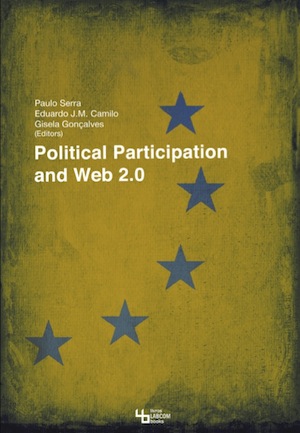by Paulo Serra, Eduardo J. M. Camilo, Gisela Gonçalves (Editores)
Collection: LabCom Books
Year of edition: 2014
ISBN: 978-989-654-133-0
Download PDF - 13086 KB
Synopsis
Despite it being a debated issue in recent decades, there is in fact no consensus regarding the potentialities of the Internet for the strengthening of citizens’ political participation and – by extension – of democracy itself. Nonetheless, this “new medium”, and, in particular, its Web 2.0 version has become the cornerstone of communication strategies for both political parties and their candidates.
Several questions emerge from the debate about the impact of the internet on political participation. First of all, the very concept of political participa- tion. Despite its importance in the theory of democracy, this concept is not always easy to define with rigor particularly when it comes to the form and boundaries of such participation. Actually, the ultimate issue is whether we are currently witnessing a “crisis of participation” or quite the contrary, the rise of alternative forms thereof. Secondly, the debate about the so-called “crisis of democracy” is also central when thinking about political participa- tion in our times. Democratic societies are experiencing a democratic deficit, to a large extend a crisis of confidence in traditional political parties, by which citizens feel misrepresented and hence alienated from righteous participation in their political destiny.
Index
Introduction 1
The research project “New media and politics: citizen participation in the websites of Portuguese political parties” 5
I CITIZENSHIP AND POLITICAL PARTICIPATION 16
Freedom as participation in Isaiah Berlin, António Fidalgo 19
From brochureware to ‘MyBo’: an overview of online elections and campaigning, Rachel Gibson 31
Notes on the construction of the journalistic event: from a politically active intellectual to the advent of Web 2.0, Giovandro Ferreira 43
II POLITICAL PARTIES AND DEMOCRACY 57
Participation and alternative democracy: social media and their con- tingencies, Peter Dahlgren 61
New bottles, old wine? New media and political parties, Carlos Jalali 87
An alternative approach: portuguese associativism and trade union associativism, Daniela Fonseca 105
III POLITICAL COMMUNICATION IN THE INTERNET AGE 118
Sound bite: politics in frames, Nuno Francisco 121
Challenges to intermedia agenda-setting: reflections on Pedro Passos Coelho’s outburst, Eduardo Camilo and Rodolfo Silva 135
Political communication 2.0: new challenges for an old art, Elsa Santos and Rosália Rodrigues 163
IV THE WEBSITES OF POLITICAL PARTIES (ANALYTICAL MODELS) 193
Online party communication: websites in the non-electoral context, Catarina Silva 197
Type, visibility and functioning of participatory resources on the web- sites of Portuguese political parties: a preliminary analysis, Joaquín Lopez del Ramo 243
CONTRIBUTORS
Web 2.0 and Political Participation 273







